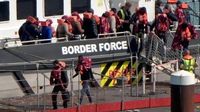The United Kingdom is poised to launch its first deportation flights returning Channel migrants to France as early as Monday, September 15, 2025, marking the beginning of a controversial “one in, one out” pilot scheme agreed between London and Paris. After months of mounting pressure to address the surge in small boat crossings, the Labour government, led by Prime Minister Sir Keir Starmer, is highlighting this moment as a significant step in its efforts to tackle irregular migration across the English Channel.
According to The Telegraph and corroborated by BBC, the first group of migrants detained under the new UK-France returns deal were apprehended on August 6 and 7, 2025, shortly after the agreement came into force. These individuals, most of whom arrived on small boats last month, have now received formal removal directions. The Home Office has informed them that they will be deported to France within five days—a move described as “imminent” by newly appointed Home Secretary Shabana Mahmood.
The “one in, one out” scheme, announced during French President Emmanuel Macron’s state visit to the UK in July, allows Britain to return to France those who enter the UK via unauthorized small boat crossings. In exchange, the UK will accept an equal number of asylum seekers from France who apply legally—primarily those with family connections in Britain and who pass strict security and eligibility checks. The arrangement is designed as both a deterrent and a pathway for legitimate asylum claims, with Mahmood and Starmer eager to scale up the pilot if it proves effective.
Under the terms agreed, France will take back adults or accompanied children who have crossed into the UK by small boat, provided any asylum claims are withdrawn or deemed inadmissible. Both countries have committed to making these transfers within three months of a migrant’s arrival in the UK. The UK, for its part, is covering transportation costs for both outgoing and incoming migrants and is paying France nearly £500 million over three years to bolster French border enforcement, a funding arrangement carried over from the previous Conservative government, according to BBC.
The logistics of the first flights are already in motion. Government sources confirmed to The Telegraph that Air France flights are scheduled for Monday, Tuesday, Wednesday, and Friday of the coming week. Migrants selected for removal were initially processed at the Home Office center in Manston, Kent, before being transferred to Harmondsworth immigration removal center near Heathrow. Mitie Care & Custody, the Home Office’s private contractor, handled the transportation and will continue to provide immigration escorts throughout the process.
For those facing deportation, the process is swift but not without recourse. Migrants have been granted access to legal representation and have seven days to appeal their removal. Lawyers, including some who previously blocked the Conservative government’s Rwanda deportation flights, are expected to mount individual legal challenges. However, there appears to be little appetite for a comprehensive judicial review of the entire policy at this stage, a notable contrast to the legal battles that stymied earlier deportation efforts.
The numbers involved in this initial phase are modest. Roughly 100 migrants were detained on arrival in the first two weeks of August, and a similar number of asylum seekers, mostly with family ties to the UK, are expected to be transferred from France. This is a small fraction compared to the average of 800 people crossing the Channel each week so far in 2025. As of September 13, more than 31,000 migrants had made the journey this year—a staggering 40% increase over the same period last year and the highest figure since records began in 2018. Since Labour took office, over 50,000 have arrived, underscoring the scale of the challenge facing the government.
The pilot scheme also comes amid tragedy and criticism. Four migrants, including two children, died last week attempting the perilous crossing, a grim reminder of the risks involved. Refugee charities have condemned the scheme as “morally repugnant,” arguing that it unfairly targets vulnerable individuals and does little to address the root causes of irregular migration. They insist the policy “must be challenged,” warning that returns on such a small scale may have limited deterrent effect. Smuggling networks, some experts caution, could even use the low probability of deportation as a selling point to would-be migrants.
The Home Office, however, is determined to send a clear message. Last week, it launched an advertising campaign in France warning migrants of the prospect of being returned if they attempt the crossing. At the same time, an online portal was opened for asylum seekers in France to register interest in the legal route to Britain. To qualify, applicants must be in France at the time of applying, demonstrate a family connection in the UK, and hail from countries with high asylum grant rates, such as Eritrea, Somalia, or Afghanistan. Successful applicants are initially granted the right to come to the UK for three months while they consider how to regularise their stay, according to government details published by BBC.
The policy is part of a broader crackdown on people-smuggling and illegal migration. In July, the government announced that 25 individuals—identified as gang leaders and small boat suppliers—had their assets frozen and were banned from travelling to the UK. An additional 300 National Crime Agency officers have been deployed to target smuggling operations, while a new Border Security Command is set to coordinate efforts between the Home Office, police, immigration enforcement, and intelligence agencies.
Political reactions have been sharply divided. Prime Minister Starmer has touted the deal as “a product of months of grown-up diplomacy” that will “deliver real results.” Home Secretary Mahmood echoed this, stating, “Protecting the UK border is our top priority. We will do whatever it takes to restore order to secure our borders.” Critics, particularly from the Conservative benches, have dismissed the scheme as “unworkable and wide open to abuse,” raising concerns about its scalability and the potential for legal loopholes. They argue that the pilot’s limited scope is unlikely to stem the tide of crossings or disrupt the sophisticated smuggling networks fueling the crisis.
Meanwhile, MPs are set to scrutinize the details of the policy further, with Home Secretary Mahmood expected to face questions in Parliament on Monday. The government maintains that the pilot is just the beginning, with hopes that a successful rollout could pave the way for a more robust and effective returns system. Yet, with Channel crossings at record highs and the human stakes as visible as ever, the coming weeks will test whether this “one in, one out” approach can make a meaningful dent in one of Britain’s most contentious and politically charged challenges.
As the first flights prepare for takeoff, the eyes of both supporters and critics will be fixed on the results—hoping, perhaps, for a turning point in a saga that has long divided the nation and tested the limits of policy, diplomacy, and compassion.




